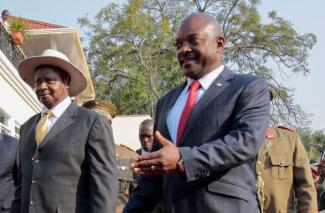Elections
Building a democratic order
 Murigraneza/AP Photo/picture-alliance
Murigraneza/AP Photo/picture-alliance
Ultimately, institutions are what people expect. They must expect leaders to observe and respect constitutional principles. Actual experience matters. If a country only has first-hand knowledge of violence, abuse and criminal action, people will not insist on clean governance. However, expectations can change. Education can make a difference, and so can civil-society activism and the media. Experience of safety and increasing opportunities in a climate of transparency and accountability will help.
Things are particularly difficult in very poor and traumatised societies. Paul Collier of Oxford University pointed out years ago that elections often cause more problems than they solve in post-crisis countries. In his eyes, democracy promotion must primarily be about defining and enforcing standards of governance. Holding elections too early, however, only means picking a leader who gets almost dictatorial powers and will want to stay in power for the rest of his – hardly ever her – life.
Burundi is a striking example. It is on the brink of civil war. Last year, it saw mass protests, a failed military coup and many incidents of violence because President Pierre Nkurunziza insisted on running for re-election once more after having served the two terms the constitution and the Arusha peace agreement of 2000 limited him to. Masses fled, but elections were held after various manipulations and postponements. Nkurunziza is still in office, his credibility is tarnished, and peace has not been restored.
Now Uganda’s President Yoweri Museveni is expected to broker a negotiated solution for Burundi, but he cannot raise the right kind of expectations. He has been in power for three decades after toppling the previous government as rebel leader. Elections reaffirmed him in office much later – and most recently in February this year, an event marked by manipulations, intimidations and arbitrary arrests.
Unfortunately, this is typical of elections in countries where a strongman culture lives on. After civil war or dictatorship, it might be better to hold elections only once a country has found some institutional stability under UN rule. The Security Council might assign an international administrator to run the country according to globally accepted standards and guided by the UN Sustainable Development Goals.
Local people should be involved in such an administration, but there should be no dominant national leader. The idea would be to start economic growth, create livelihoods and improve standards of life as well as to nurture the rule of law and promote education. Collier argues that growing prosperity provides more legitimacy than winner-takes-all elections do.
On such a basis, a new constitution could eventually be designed – and elections would make sense. This approach deserves consideration. It might have helped the troubled Central African Republic start anew. Instead, it recently spent months grappling with a confusing and unconvincing election with no immediate benefit for development. Critics will say that it is impossible to introduce a democratic order without elections. They have a point. We know from experience, however, that holding elections too early without the necessary institutional underpinning is no reliable way to build a democratic order either.
Given time, human development and space for civil society, democratic change is possible. In Asia, Africa and Latin America, elections have led to peaceful changes of government in recent times – consider Taiwan, Indonesia, Sri Lanka, Nigeria, Senegal, Chile or Argentina. This does not mean that governance is perfect there – but it does show that people’s expectations can change for the better.
Hans Dembowski is editor in chief of D+C/E+Z.
euz.editor@fs-medien.de
